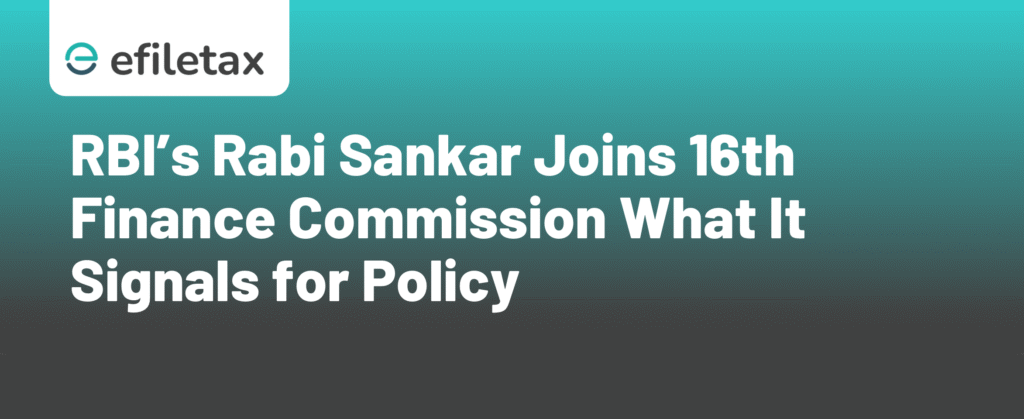
T. Rabi Sankar Joins 16th Finance Commission What It Means for India
Focus keyphrase: 16th Finance Commission
The Government of India has appointed Shri T. Rabi Sankar, Deputy Governor of the Reserve Bank of India (RBI), as a part-time Member of the 16th Finance Commission. This significant development, announced in June 2025, adds monetary policy experience to a body that shapes India’s fiscal federalism.
Let’s break down what this means for Indian taxpayers, professionals, and policy observers.
What Is the 16th Finance Commission?
- Constituted under Article 280 of the Indian Constitution
- Recommends the distribution of taxes between Centre and States
- Suggests grants-in-aid, fiscal consolidation, and debt sustainability
- Set up every five years by the President of India
📌 Notification: Ministry of Finance Order dated 31st December 2023 under Article 280(1)
Who Is T. Rabi Sankar?
- Currently a Deputy Governor at RBI
- Formerly led Department of Payment and Settlement Systems
- Known for his work in digital payments and monetary policy
- Holds deep understanding of India’s macroeconomic framework
His inclusion is expected to bring a data-driven and tech-forward approach to fiscal policymaking.
Key Responsibilities of the 16th Finance Commission
| Area | Details |
|---|---|
| Tax Sharing | Distribution of net proceeds between Union & States |
| Fiscal Transfers | Recommendations on revenue deficit grants, disaster relief, etc. |
| Performance Incentives | For reforms in power sector, ULB finances, infrastructure, etc. |
| Debt Sustainability | Suggest roadmap for Centre and State borrowings |
| New Priorities (likely) | Green budgeting, AI taxation, digital economy integration |
Legal & Policy Significance
- Constitutional Role: Under Article 280, its report is binding in spirit for resource allocation
- Fiscal Reforms: Recommendations can reshape GST compensation, capital grants, and debt norms
- GST Relevance: Often suggests structural improvements in GST distribution to states
Expert View: Why His Appointment Matters
“T. Rabi Sankar brings the much-needed monetary policy lens to a largely fiscal domain. With rising federal tensions over tax devolution, his RBI background may help balance macro-stability with fiscal equity.”
– Amit Kumar, Policy Economist
What to Expect from the 16th Finance Commission Report (Due Oct 2025)
- A formula-based approach to vertical and horizontal tax devolution
- Recommendations for digitally empowered fiscal governance
- Likely focus on climate financing, ESG-linked transfers, and AI-driven tax strategy
- Push for performance-linked incentives for states undertaking reforms
FAQs
Q1: Is the Finance Commission’s recommendation binding?
A: No, but Union Budget generally implements it fully or with minor tweaks.
Q2: When will the 16th Finance Commission report be submitted?
A: On or before 31st October 2025, per presidential terms of reference.
Q3: How does it affect GST?
A: It influences how GST revenue is shared between Centre and States, though not directly responsible for rate decisions.
Summary
T. Rabi Sankar, RBI Deputy Governor, is now a part-time Member of the 16th Finance Commission. His monetary policy expertise will help shape India’s tax sharing and fiscal strategy through the commission’s 2025 report.